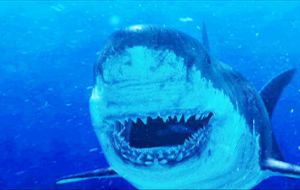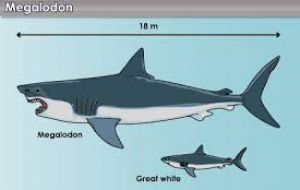MercoPress. South Atlantic News Agency
Megaladons the giant shark predator that kept whales on the run
 The megalodon was not only large, it was powerful as well. Four times the size of a modern great white, with jaws wide enough to swallow a whole cow.
The megalodon was not only large, it was powerful as well. Four times the size of a modern great white, with jaws wide enough to swallow a whole cow.  Apparently these deadly predators were the reason why whales were much smaller millions of years ago.
Apparently these deadly predators were the reason why whales were much smaller millions of years ago. Few fish are as steeped in myth and conjecture as the megalodon, a giant shark that lived roughly 28 million to a few million years ago. This fearsome-looking shark is the subject of numerous documentaries, rumored sightings, and even well-funded search expeditions. While the species may be extinct, its legend certainly lives on.
A recently published study in the Journal Plos One has added to that reputation by suggesting that these deadly predators were the reason why whales were much smaller millions of years ago. Megalodons, as it turned out, might have had an appetite for the largest mammals in existence.
According to the study, researchers Catalina Pimiento and Christopher Clements produced what they believed to be the best estimate of when these gigantic sharks went extinct—2.6 million years ago. They noticed that the date coincided with the evolution of gigantism in whales.
“It has been widely stated in the literature that the extinction of apex predators can trigger cascading effects through entire food webs and impact ecosystem composition and function,” the study stated.
Could one of those impacts be today’s massive whales? Researchers have previously found fossilized whale skeletons with megalodon teeth embedded within them. While scientists are not sure if this means that the ancient shark actually did prey on whales, it certainly seems to suggest that. Pimiento, a researcher at the University of Florida, said that it does make sense for whales to have grown bigger since the absence of the ocean’s top predator.
“From modern sharks, it is known that larger individuals have a broader range of prey size, including larger prey,” Pimiento told the BBC. “That means that the larger prey will be predated mostly by larger sharks.”
The megalodon was not only large, it was powerful as well. At roughly four times the size of a modern great white, scientists believe that the megalodon could bite down on prey with a force of 10.8 to 18.2 tons. Their teeth alone measure about seven inches long and their jaws are wide enough to swallow a cow whole. Yet their size hindered their mobility, something that prehistoric whales could have taken advantage of.
Baleen whales of that time period were significantly smaller than their descendants, which may have offered them the agility to escape the megalodon. With the shark’s extinction 2.6 million years ago, whales found themselves mostly without any predators, and were free to grow larger.
“Future research will investigate if megalodon’s extinction played a part in the evolution of these new classes of whales” said Pimiento. The researchers added that their next project will be to find out exactly what killed off the megalodon.




Top Comments
Disclaimer & comment rules-

-

-

Read all commentsAnother victim of British depredation and lack of humanity.
Oct 28th, 2014 - 03:02 pm 0@1
Oct 28th, 2014 - 05:16 pm 0“Another victim of British depredation and lack of humanity.”
In what way?
It looks like what your daddy sees when you get on your knees.......of i =s that your momma tranny boi and he tells you he's your momma? You find the estrogen yet?
Oct 28th, 2014 - 05:17 pm 0Commenting for this story is now closed.
If you have a Facebook account, become a fan and comment on our Facebook Page!